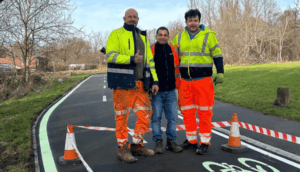The Road Safety Markings Association (RSMA) has today welcomed the Department for Transport (DfT)
announcement to amend the Highway Code to “ensure the first self-driving vehicles are introduced safely
on UK roads”. However, it warns that Government’s desire for the UK to become a world-leader in the
use of autonomous vehicles may be thwarted as a result of poor infrastructure.
In the short to medium term well-maintained, high quality road markings are essential for the successful
operation of semi/fully autonomous vehicles. If Government fails to invest in upgrading and maintaining
road markings on the strategic road network and local authority A-roads, highly capable vehicles will fail
to operate successfully.
Stu McInroy, RSMA Chief Executive, said “The RSMA fully supports the Government’s ambition to be a
world-leader in autonomous vehicles, however, it must ensure that the UK’s infrastructure is able to
support this aim. The Government, in announcing regulatory changes to allow the use of certain
technologies while autonomous vehicles are operating, appears to be focussing on everything except the
most critical element of the drive towards the operation of semi/fully autonomous vehicles – road
markings.
“For semi/fully autonomous vehicles to operate without input from the driver, the vehicle must be able to
read the road; this cannot be done if the road markings are not maintained to an appropriate standard.
Road markings are the rails of the road and are essential if semi/fully autonomous vehicles are to operate
successfully; the current UK infrastructure threatens to undermine and potentially prevent their
successful roll-out.
“If Government is serious about being a world-leader in autonomy, it must provide ring-fenced funding
for road marking infrastructure. If such actions are not undertaken, this Government’s ambitions for
autonomous vehicles will remain just that – an ambition.”
























